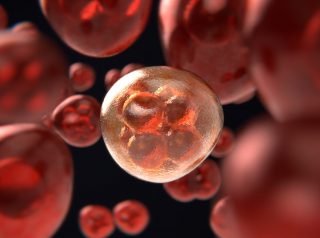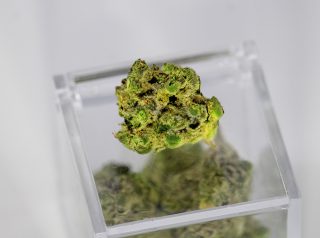Thanks to the countless anecdotes, first-hand accounts, and scientific reports, the medicinal benefits of marijuana are becoming more widely known. Unsurprisingly, many patients suffering from chronic conditions have turned to the plant for relief. This includes people living with HIV/AIDS who use it to manage their symptoms, including pain, poor appetite, and nausea. Interestingly, there are also suggestions that cannabis could slow – or even prevent – HIV progression.

Is there scientific evidence backing up all these claims? Or could they merely be hearsay? Find out what the current research has to say on marijuana and AIDS.
Page Content
Marijuana and AIDS: What You Should Know
AIDS refers to acquired immunodeficiency syndrome – a chronic condition caused by a virus called HIV. It is considered the most advanced stage of HIV infection. In the United States alone, about 1.1 million live with this virus, with 14% unaware of it.
Currently, AIDS has no cure with life expectancy around three years. Although potentially life-threatening, medical interventions – most notably antiretroviral drugs – can help control it. They work by lowering the amount of virus in the body, keeping the immune system healthy enough to combat infections.

HIV attacks the immune system – a complex network that helps the body fight off infections. If HIV progresses to AIDS, it means that the immune system is already severely compromised. This makes an individual more prone to various types of diseases, infections, and cancers.
Unfortunately, antiretrovirals are also rife with side effects, including nausea, vomiting, fatigue, and appetite loss. These – coupled with the symptoms of the condition – can make life a living hell. To cope, some people with AIDS have turned to medical marijuana.
I. How Marijuana Can Help People with AIDS
Aside from increasing the risk of infections and cancers, AIDS can also trigger a host of conditions, including chronic pain, nerve damage, and wasting syndrome. And due to the nature of AIDS, it is hardly surprising that many patients struggle with anxiety and depression as well.
This is where marijuana comes in. Thanks to its array of medicinal benefits, it could ease various debilitating conditions, whether mental or physiological. On top of that, it could also address multiple symptoms simultaneously.

In one study, 143 out of 523 HIV-positive individuals used cannabis to treat their symptoms. They reported an improvement in the following symptoms:
- Appetite (97%)
- Muscle pain (94%)
- Nausea (93%)
- Anxiety (93%)
- Nerve pain (90%)
- Depression (86%)
- Paresthesia (85%)
In another study, a large percentage of patients affirmed that marijuana could help ease HIV/AIDS-related symptoms, including anxiety and/or depression (57%), poor appetite (53%), and pain (28%). Furthermore, among 250 HIV-infected patients, the medicinal use of marijuana showed a trend toward facilitating adherence to antiretroviral therapy in patients with nausea. Other illicit substances, in contrast, may impede adherence.
By offering symptom relief, cannabis can help people with AIDS stick to their treatment plan – also called adherence. Due to nausea and appetite loss, some end up delaying or skipping a dose entirely. This is detrimental and could allow the virus to replicate itself again in the body. Even worse, it could become resistant to the drugs. This makes it challenging – if not impossible – to treat HIV.
Analgesic Properties
Pain is common for people living with AIDS. It can be caused by HIV, secondary infections, or medications. Types of HIV-related pain include headaches, joint pain, and abdominal cramping.
When the virus wreaks havoc to the peripheral nerves, it can lead to peripheral neuropathy. It is characterized by pain, numbness, tingling, and muscle weakness in the hands and feet, as well as increased pain sensitivity.
For some, the pain lasts for a long time. Worse, it may also incapacitate and interfere with the day-to-day activities of an individual.
Due to having potent analgesic properties, marijuana could help alleviate chronic, severe pain. It is also emerging as a potential alternative to opioids – the most potent pain relievers available. Although effective, opioid medications can lead to dependence and abuse, as well as trigger adverse effects.
On the contrary, marijuana is well-tolerated. Research indicates that it could be useful in treating neuropathic pain. It has shown promising upsides in HIV-infected adults when used alongside existing analgesics. There is also evidence of its ability to reduce the intensity of pain in patients with post-traumatic or post-surgical neuropathic pain.
Appetite-Stimulating Properties
AIDS wasting syndrome – a combination of anorexia and cachexia – is an involuntary weight loss of more than 10% of the body weight, especially muscle. HIV, opportunistic infections, and inflammation usually cause it. Often, it is accompanied by poor appetite.
Marijuana is known for causing hunger – also called the munchies. That is because THC – the principal psychoactive ingredient of the plant – binds and activates the CB1 receptors, which helps regulate food intake. And by stimulating the appetite, it can help a person gain weight or – at the very least – curb weight loss.

The FDA has approved the use of dronabinol – a synthetic form of THC – for treating loss of appetite, leading to weight loss in people with AIDS. In one clinical trial, 2.5 mg of this drug showed it is safe and effective.
Antiemetic Properties
Antiretroviral drugs – particularly protease inhibitors – often cause nausea and vomiting as side effects. In most cases, it is similar to what cancer patients experience when they receive chemotherapy or chemo.
Marijuana, fortunately, has antiemetic properties and could help regulate nausea and vomiting. Although most studies primarily focus on chemo-induced emesis, it remains unclear how effective it could be in easing nausea and vomiting caused by AIDS medications. But, many people with AIDS vouch for its efficacy. Incidentally, dronabinol did not only prevent weight loss but also decreased nausea, possibly serving as an indicator of THC’s effectiveness in this regard.
Anxiolytic and Antidepressant Properties
AIDS does not only take a toll on the body but the mental well-being as well. Even patients whose symptoms are being controlled may feel anxious and depressed. It is, after all, a chronic illness that requires life-long treatment. Marijuana is helpful in this regard. It has anxiolytic and antidepressant properties, helping melt away stress while elevating the mood. CBD, in particular, can be a promising treatment for anxiety disorders.

II. Potential Benefits of Marijuana on AIDS
Since the cannabinoid receptors – particularly CB2 – are expressed in the immune cells, it is not unlikely that marijuana could also affect the disease progression of HIV. Unfortunately, research on the topic is scarce. Current evidence do suggest that its effects on immunomodulation and inflammation – most notably neuroinflammation – may play a critical role.
Immunomodulatory Properties
Researchers study the simian immunodeficiency virus (SIV) to learn more about HIV/AIDS. SIV is an HIV-like virus that infects monkeys and apes, causing a disease similar to AIDS.
Chronic administration of THC before and during SIV infection slowed down disease progression, reduced viral load and tissue inflammation, and lowered morbidity and mortality of SIV-infected primates. The underlying mechanisms are unclear. But it could be attributed to multiple cannabinoid-mediated effects on viral infection, inflammatory responses, neuroendocrine and localized responses to infection, and viral replication, among others. The immunomodulatory role of the cannabinoids could be useful in inhibiting the progression of HIV infection.
Anti-Neuroinflammatory Properties
Cognitive decline or HIV-associated neurocognitive disorder is one of the health complications of HIV. Typically, it occurs due to the dysfunction, damage, and death of neurons, driven by chronic immune activations and central nervous system inflammation. And, elevated levels of CD16+ monocytes could contribute to this neuroinflammation.
THC could help slow down the peripheral monocyte processes involved in HIV-associated neuroinflammation. CBD with a low affinity to the cannabinoid receptors, on the other hand, did not influence monocyte expression. It indicates that THC modulated monocyte activity via a CB1/CB2-dependent mechanism. As such, THC could be useful in the treatment of HIV-associated neuroinflammation and cognitive decline.
Aside from being anti-inflammatory, THC and CBD may also have antiviral action by regulating neuroinflammation. In another study, WIN55,212-2 – a cannabinoid receptor agonist like THC – directly suppressed HIV-1 replication in microglial cell cultures. Furthermore, using marijuana alongside antiretroviral medications resulted in faster HIV DNA decay.
III. Possible Risks of Marijuana on AIDS
Although promising, using marijuana to treat AIDS symptoms and complications is not without risks. Most of the adverse outcomes could be ascribed to THC. Ironically, while it could alleviate several AIDS symptoms and treatment side effects, it could also worsen or even induce them.
For instance, chronic cannabis abuse could lead to a relatively new condition called cannabinoid hyperemesis syndrome, which is characterized by cyclic episodes of nausea, vomiting, and abdominal pain.
The appetite-boosting activity of THC is more or less established. However, the same cannot be said of CBD, which has been reported to reduce or increase appetite.
Marijuana could also have ill effects on mental health. THC, in particular, has a biphasic dose-response on anxiety. In other words, it alleviates anxiousness at lower doses but could cause it at higher doses. Frequent use may also worsen anxiety and depressive symptoms.
Aside from these, there are other potential risks to consider.
May Increase Likelihood of Lung Diseases
Compared to tobacco smoke, marijuana smoke is far less likely to cause negative pulmonary health effects. Still, the risk is there – and it may be more apparent in people with AIDS.

According to one study, HIV-infected individuals may be more susceptible to pulmonary complications brought about by marijuana smoke exposure. This could be attributed to their unique lung biology and weakened host immune response.
May Negatively Impact Memory
Previously, marijuana was shown to be potentially useful in addressing neuroinflammation and cognitive disorders. Ironically, it may also have adverse effects on cognition, particularly memory. This is problematic as memory deficits are prevalent among people with AIDS.
One study, for example, showed impaired short-term memory as an acute side effect of cannabis use. Another research found that THC disrupted working and episodic memory in both animals and humans. Working memory – a part of short-term memory – refers to information a person is immediately aware of. Episodic memory, on the other hand, is a part of long-term memory and refers to a person’s memory of a specific event.
How, then, does this affect people with AIDS?
According to one review, the ill effects of marijuana use on memory are more pronounced in HIV-infected individuals already experiencing cognitive declines.
During memory tasks, affected patients often activate brain areas that are usually not associated with cognition. This is a way to compensate for their neurocognitive dysfunction. Their memory, however, becomes further impaired with cannabis use, increasing the neural activation in the other brain areas. This chain of events could only result in more noticeable memory impairments. But, it is not clear how it would contribute to the neurocognitive decline associated with HIV/AIDS.
Using Marijuana to Escape the Horrors of AIDS
Marijuana could relieve the many debilitating symptoms associated with AIDS, including the side effects of treatment and medication. Simply put, it improves the quality of life, allowing patients to live more comfortably.
But, keep in mind that research on the impact of marijuana use on AIDS symptoms and side effects is limited. This makes it hard to determine how effective it is and how to use it for the best results. In most cases, you may have to experiment.

Moreover, be aware that cannabis use could also worsen or generate some of the symptoms it is meant to treat. To minimize or avoid the risks, make sure to consume moderately and responsibly. You may also want to opt for CBD, which is associated with fewer side effects. If possible, seek the guidance of a healthcare professional.
Remember, use marijuana as an adjunct treatment – not a standalone. After all, there is still not enough proof that it could combat HIV or slow down disease progression. That being said, adhere to your antiretroviral therapy. Fortunately, by reducing nausea, increasing appetite, and improving your overall well-being, cannabis can make it easier for you to stick to your treatment regimen.





